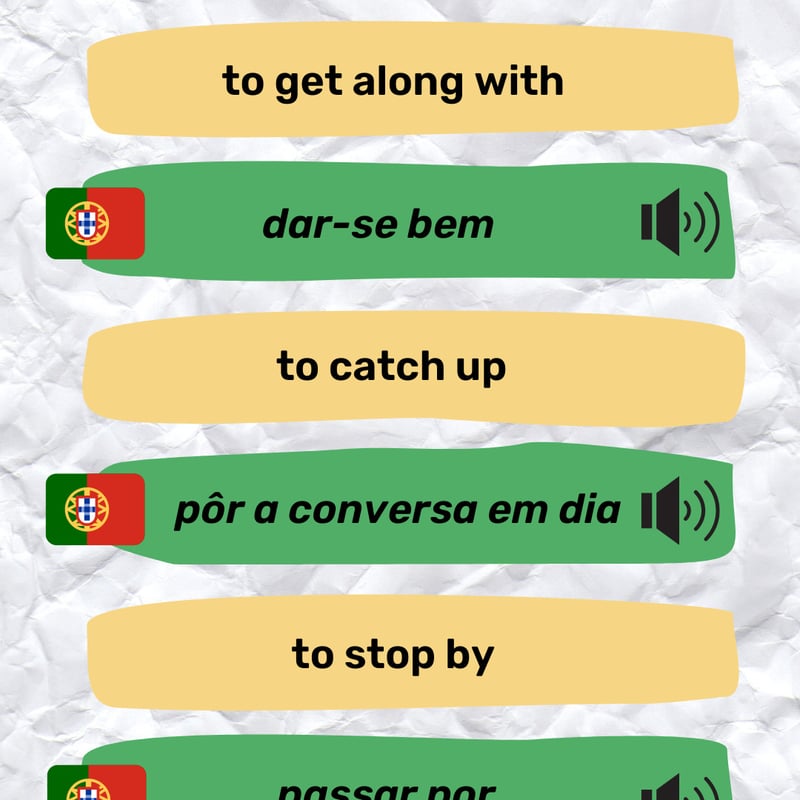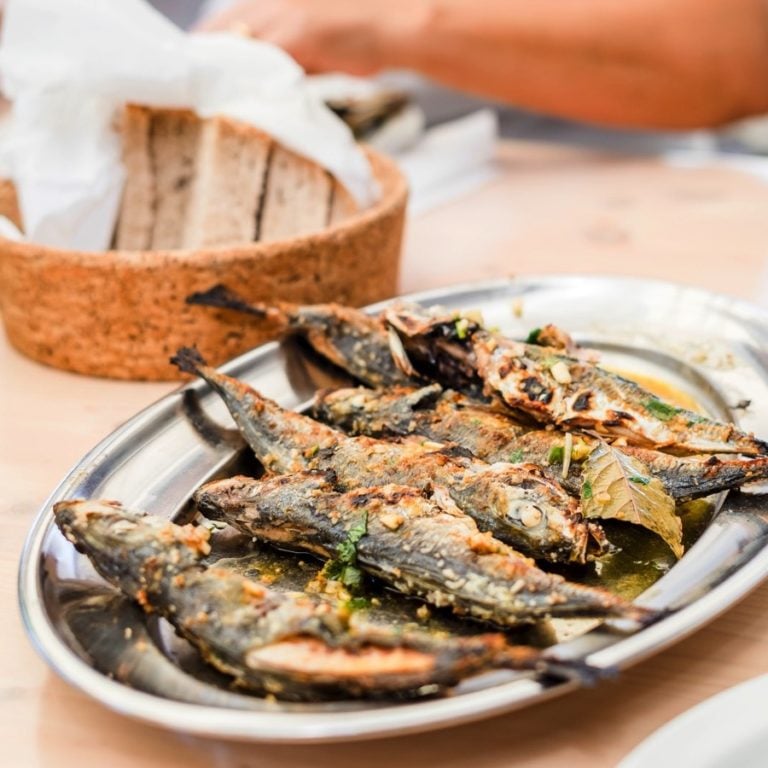The first compound tense we’re going to talk about is the pretérito perfeito composto do indicativo. To keep it short, and since the focus of this unit will just be the indicativo mood, we’ll just call it pretérito perfeito composto. So let’s get to it! As you are likely aware, the pretérito perfeito (simple past […]
Pretérito Perfeito Composto do Indicativo
Condicional Composto
Let’s talk about the compound form of modo condicional (conditional mood), which is the mood used for certain hypothetical situations and possibilities. If you need a refresher on the simple form first, check out this Unit, or here are a couple examples to jog your memory: Now, the compound form of the conditional can indicate a […]
Futuro Composto do Indicativo
Now we’ll turn our attention to the futuro composto do indicativo! (Let’s call it futuro composto for short) As you’re aware, an action in the futuro simples (simple future tense) takes place after the time the utterance is spoken and isn’t related to any other actions. In the futuro composto, however, the future action represented […]
More Irregular Verbs in the Simple Past
In the Simple Past 2 unit we practiced with some of the most common irregular Portuguese verbs in the simple past (pretérito perfeito do indicativo): ir, ser, estar, dar, and querer. Now let’s continue with a few more!
Andar a Contar Tostões
Pinching Pennies
Join Diogo and Sandra in a silly conversation about money troubles and relationship drama. Along the way, take note of how the verb “andar” is used in context.
Pretérito Mais-que-perfeito Composto do Indicativo
The pretérito mais-que-perfeito do indicativo is the tense used to indicate an event that took place in the past before another event. As the name suggests, it’s beyond (“more than”) the pretérito perfeito tense. Unlike with pretérito perfeito, the pretérito mais-que-perfeito’s simple and compound forms both have the same meaning. The compound form we’re going […]
Como Vós Estais Hoje?
How Are You Today? (using “vós”)
Manuel offers to help his neighbour with some yard work. This Shorty includes the personal pronoun vós (another pronoun for “you”) and conjugation of verbs in that form. We don’t use vós in most of our content, or in the Verbs section, because it has fallen out of use nowadays, except in specific regions and […]
Uma Festa de Arromba
A Wild Party
Pedro is shocked when he returns home to find the aftermath of Sofia’s wild house party. Notice how the verb ficar is used in different ways throughout the dialogue.
Jantar em Casa do José
Dinner At José's House
José and Diogo watch the game together. Keep an eye (or ear) out for irregular verbs in the present tense, such as ter, poder, querer, and ir, plus many common conversational phrases.
Compound Tenses in the Subjunctive Mood
In Compound Tenses 1, we focused on in the indicative and conditional moods. Now we’ll cover compound tenses in the , as well as . Don’t worry, the basic formula is still the same 😉: auxiliary verb ter + past participle of the main verb. Quick Overview Here are the forms we’ll cover in this […]
Compound Tenses in the Indicative and Conditional Moods
Up until now, we’ve mostly been working with simple tenses, but now it’s time to explore the various compound tenses in Portuguese. This Learning Note is just an introduction to the general concepts — we’ll cover each one in more detail as you progress through the Unit. What Are Compound Tenses? A Portuguese verb form […]
As Recomendações Da Sara
Sara's Recommendations
Sara gives Ana recommendations for new TV series to watch.
The Verb Saber
The Portuguese verb has two different meanings. Most of the time, it means 🧠 to know, but did you know in certain contexts it can also mean 👅 to taste? Saber is conjugated in the 3rd person singular in both sentences, so it’s written exactly the same, but with an entirely different meaning. In the […]
Saber vs. Conhecer
The verbs and cause a lot of confusion for Portuguese learners. If you translate them into English, both mean to know, but in Portuguese you also have to pay attention to the context in order to know 😉 which one to use. Saber: Talking About Information You Know We use saber to talk about facts […]
A Few More Common Irregular Verbs
If you remember the Common Irregular Verbs unit, this is part 2! As you may remember, Portuguese verbs can be irregular in the root, the ending, or both, and they are often irregular only in certain tenses. Here’s an overview of most of the verbs we’ll cover in the following Lessons. For now, we’re continuing […]
English Expressions in Portuguese
One challenge of learning Portuguese, or any language, is that you can’t simply translate literally. Each language has its own conventions for how to word different concepts. This is known as idiomatic language. In this Learning Note, we’re focusing mostly on how to translate English “phrasal verbs” into Portuguese. (If you’re looking for other types […]
Rita E Raquel Vão Ao Cinema
Rita And Raquel Go To The Movie Theater
Rita and Raquel talk about their plans as they get ready to go out for the evening. Listen for regular -ar verbs conjugated in the present tense.
O Miguel Faz A Vontade À Gisela
Miguel Humors Gisela
Gisela tells Miguel about her new favourite TV show. Take note of the irregular verbs used throughout the dialogue.
Spelling Variations in Regular Verbs
After learning the rules for conjugating verbs, you may have noticed that certain Portuguese verbs are not spelled the way you would expect… If a verb is spelled and spoken completely differently, this is because it’s an irregular verb. But if it’s still spoken as expected, it probably just means it’s a regular verb with […]
Liliana Precisa De Tempo
Liliana Needs Time
Liliana and Bruno discuss some problems in their relationship. Notice how the verb ficar is used in a variety of different ways throughout their conversation.
Basic Portuguese Grammar
This Learning Note was designed to serve as a very condensed overview of basic Portuguese grammar. We hope this will help give you a “big picture” view of the language before you dive into the details. You’ll notice there are many links throughout, in case you want to explore a particular topic, or bookmark it […]
A Sopa da Diana
Diana's Soup
A group of friends are about to go see a movie. Before they leave, Diana decides to make dinner for everyone, despite not being a very good cook… Take note of how regular -ar verbs (such as chegar, começar, cozinhar, ajudar, cortar, etc.) are conjugated in the present tense (presente do indicativo) throughout the dialogue. […]
Carapaus de Corrida
Racing Horse Mackerels (i.e. Getting Cocky)
Rodrigo reminisces about his favourite tavern: Tasquinha do Zé Pipo. Notice how the imperfeito do indicativo (past continuous) is used throughout the dialogue.
Auxiliary Verbs
Let’s talk about an important topic: Portuguese auxiliary verbs! In a verb phrase (locução verbal), an auxiliary verb comes before the main verb. Essentially, its job is to “help” the main verb. Most Common Portuguese Auxiliary Verbs Here are a few of the most common , which you will probably recognize: Here are just a […]







 Joana
Joana Luís
Luís

 Eduardo
Eduardo
 Eliana
Eliana Rui
Rui



 Mónica
Mónica







 Sandra
Sandra


